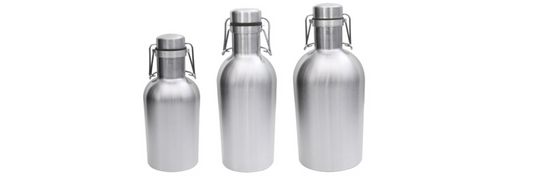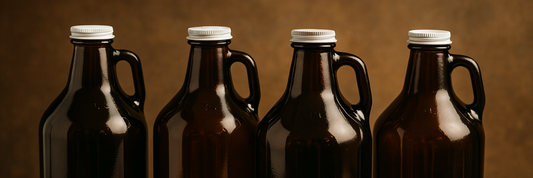Whether you’re recycling beer bottles, crafting, or collecting unique labels, removing labels from beer bottles can be tricky. The adhesive, material, and type of label can affect how easily it comes off. This article explores various methods and tips for getting labels off beer bottles smoothly, including DIY techniques and tools, so you can make the most of your clean, label-free bottles.
- Crafting the Perfect Beer Label: Types, Design and Customization
- Beer Bottle Dimensions Explained: A Guide for Brewers and Retailers
- How to Open a Beer Bottle: Tips and Techniques for Every Situation
- Pros and Cons of Green Beer Bottles: A Guide for Breweries and Consumers
- Exploring the Different Types of Glass Bottles and Their Uses
Why Remove Labels from Beer Bottles?
Recycling and Reusing Beer Bottles
For those who prioritize recycling, removing labels from beer bottles is essential. Labels, particularly if they’re adhesive or waterproof, can disrupt the recycling process by contaminating other materials.
Taking the extra time to remove them improves the recycling stream's purity and increases the likelihood that your bottles will be reused or turned into new glass products. Clean, label-free bottles are also ideal for reusing in personal projects or as unique storage options around the house.

Crafting and DIY Projects
Many people remove labels from beer bottles to repurpose them for creative crafts and DIY projects. Label-free bottles can be used for customized decor like candles, vases, or personalized gifts. Clean bottles also work well for projects that involve painting or engraving, as they provide a smooth, residue-free surface to work on.
Collecting or Displaying Bottles
For collectors, the beer label is often as valuable as the bottle itself. Preserving unique or vintage labels can add character to a collection. However, careful removal is key, especially if the goal is to keep the label intact for framing or displaying. Knowing the right methods and techniques can help you remove labels without tearing or damaging them, allowing you to store or display them with ease.
Preparation Before Removing Labels
Gather Necessary Supplies
Before starting, gather supplies like:
- Hot water and dish soap
- Baking soda and vinegar
- Rubbing alcohol or nail polish remover
- A razor blade or plastic scraper
- Adhesive remover (e.g., Goo Gone)
- A clean sponge or cloth
Having the right tools on hand ensures you can try different methods and remove stubborn labels effectively.
Selecting the Right Method Based on Label Type
Different label types require different removal methods. Adhesive-based labels may respond better to solvents, while glue-based labels can often be softened with heat or water. Waterproof or heat-sensitive labels may require more specialized techniques. Identifying the type of label on the bottle will help you choose the most efficient method for removal.
Popular Methods: How to Remove Labels From Beer Bottles
Method 1: Soaking in Hot Water and Dish Soap
This is a simple and eco-friendly method. Fill a container with hot water and add a few drops of dish soap. Submerge the bottles and let them soak for 30 minutes to an hour. The warm, soapy water should weaken the adhesive, allowing you to peel off the label with minimal resistance. For stubborn labels, use a razor blade or scraper to gently lift the edges.

Method 2: Using Baking Soda and Vinegar Solution
Create a solution using equal parts baking soda and vinegar to form a paste, then apply it directly to the label. The combination of baking soda’s abrasiveness and vinegar’s acidity helps break down the adhesive. After letting it sit for about 15 minutes, scrub the label gently with a sponge or cloth until it loosens.
Method 3: Steam Method
For this method, boil water and hold the bottle over the steam to soften the adhesive. The steam loosens the label, making it easier to peel off. This method works well for glue-based labels and doesn’t require any additional chemicals, making it ideal for eco-conscious users.
Method 4: Oven-Bake Method
Preheat your oven to a low temperature (around 200°F/93°C) and place the bottles inside for 10–15 minutes. The heat will soften the adhesive, allowing the label to peel off more easily. Be cautious when handling hot bottles and always use oven mitts. This method is particularly effective for stubborn adhesive labels, but remember to cool the bottles before touching them.

Method 5: Freezer Technique
If you have a sticky label that won’t budge, try placing the bottle in the freezer for a few hours. Freezing can harden the adhesive, making it easier to peel off the label without tearing. After freezing, use a razor blade or plastic scraper to lift the label gently.
Method 6: Rubbing Alcohol or Nail Polish Remover
Apply rubbing alcohol or nail polish remover to a cloth and rub it on the label until the adhesive loosens. These solvents work well for adhesive-based labels and can help remove any sticky residue left behind. Make sure to work in a well-ventilated area and wear gloves if necessary.
Method 7: Chemical Adhesive Removers (e.g., Goo Gone)
Chemical adhesive removers like Goo Gone can dissolve tough adhesives quickly. Apply a small amount to the label and let it sit for a few minutes, then use a scraper to remove the label. Although effective, be cautious when using chemicals and rinse the bottle thoroughly afterward.
How to Get a Label Off a Beer Bottle Without Ruining It
Peeling Labels Carefully
Start by lifting one corner of the label with a razor or scraper. Peel slowly to avoid tears, as sudden movements can damage the paper. Use a scraper or your fingers to support the label as you remove it.
Preventing Label Tears and Wrinkles
Avoid common mistakes, like pulling too quickly or using sharp tools that can damage delicate paper labels. A steady, even pull will help preserve the label’s shape and integrity.
Best Practices for Different Label Materials
Paper labels, plastic-coated labels, and foil labels each have different sensitivities. Plastic or waterproof labels may need a combination of heat and solvent, while paper labels respond well to soaking or steaming. Foil labels are often delicate and may benefit from a combination of freezing and gentle peeling.

Cleaning Up After Label Removal
Removing Sticky Residue from Beer Bottles
If adhesive remains on the bottle after the label is removed, try dish soap, rubbing alcohol, or a mixture of baking soda and oil. Gently scrub until the residue is gone, then rinse with warm water.
Final Bottle Wash
Once the label and any residue are removed, wash the bottle thoroughly with dish soap and hot water to ensure it’s clean for reuse in DIY projects or decorative purposes.
Recycling Properly if Needed
If recycling the bottle, ensure all adhesive and labels are removed. Recycling centers prefer clean bottles without residue, as this reduces contamination during the recycling process.
Tips for Specific Label Types
Foil Labels
Foil labels are often more durable but can be sensitive to certain chemicals. Try soaking these labels in hot water before peeling, or use the freezer technique if they’re stubborn.
Waterproof Labels
Waterproof labels typically have strong adhesives that resist soaking. Using steam, rubbing alcohol, or an adhesive remover may be more effective for these labels.
Vintage or Fragile Labels
If you’re preserving a vintage or delicate label, avoid aggressive techniques. Use minimal heat or the freezer method, and always peel slowly to maintain the label’s integrity.
Creative Uses for Removed Beer Bottle Labels and Bottles
Crafting Ideas Using Beer Bottle Labels
Once removed, labels can be used in DIY crafts such as creating collages, coasters, or framed art. Vintage or rare labels make unique decor and can be displayed in shadow boxes or on scrapbook pages.
Reusing Bottles for DIY Projects
Clean, label-free bottles are perfect for upcycling into vases, lamps, candle holders, or soap dispensers. They make great gifts, especially when personalized with paint or engravings.
Collecting and Displaying Beer Bottle Labels
For collectors, preserving and displaying labels can be a fun hobby. Use acid-free paper and frames to protect labels, or create a dedicated album to showcase them.
Conclusion
Removing labels from beer bottles doesn’t have to be challenging with the right approach. Whether you’re recycling, crafting, or collecting, these techniques offer a range of solutions to help you achieve label-free bottles, ready for whatever project you have in mind.









